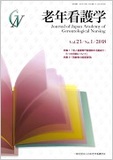Japanese
English
- 販売していません
- Abstract 文献概要
- 参考文献 Reference
抄録
本研究の目的は,遷延性意識障害高齢者のプラスの反応を引き出すケアの構成要素と,看護師としての変容過程を明らかにすることである.方法は参加観察と半構造化面接による質的帰納的研究である.対象は,職務経験9年以上で遷延性意識障害患者看護の経験が3年以上の看護師8人を対象とした.その結果,遷延性意識障害高齢者のプラスの反応を引き出すケアの構成要素は[きっかけを仕掛けて反応を待つ][わずかな反応から推測する]【意思や感情を代弁し交流する】[新たな反応を家族やスタッフと共有し巻き込む][家族の関心をつなぎとめる]であった.また,看護師は[義務的・機械的に看護する]時期があったが,[自己嫌悪を機に見つめ直す]ことで[人生経験,看護経験を手がかりに関わる]ようになり,患者や家族の力を目の当たりにして【患者の力をこの瞬間も信じる】ようになっていた.そしてこの関わりのなかで見つけた[ささやかなやりがいを支えにする]ことによって実践し続けてきた変容過程が明らかになった.
This study aims to elucidate components of care that elicit positive responses from elderly individuals in a persistent vegetative state and the process of changes that nurses undergo as they accumulate experience. This study comprised a qualitative inductive analysis of participant observations and semi-structured interviews. We enrolled 8 nurses with 9 or more years of professional experience and 3 or more years of experience in caring for patients in a persistent vegetative state. The results identified ‘initiating triggers and waiting for a response,’ ‘deciphering and predicting based on subtle reactions,’ ‘interpreting intentions and emotions and speaking for the patients,’ ‘sharing new responses with family and other staff members to involve them in communication with the patients,’ and ‘maintaining the family members' interest’ as the components of care that elicit positive responses from elderly individuals in a persistent vegetative state. Nurses experienced a phase of ‘working mechanically out of duty as a nurse,’ but came to ‘reflect and reconsider when they experienced a sense of self-disgust’ and began to ‘incorporate hints obtained through nursing and personal life experiences into interactions with patients.’ These were then followed by gaining “faith in the patient's strengths through each moment” as they ‘witnessed the patient or the family's strengths.’ Therefore, the process of change that nurses undergo was demonstrated through these interactions that provided the ‘small sense of fulfillment that they relied on.’
Copyright © 2018, Japan Academy of Gerontological Nursing All rights reserved.


